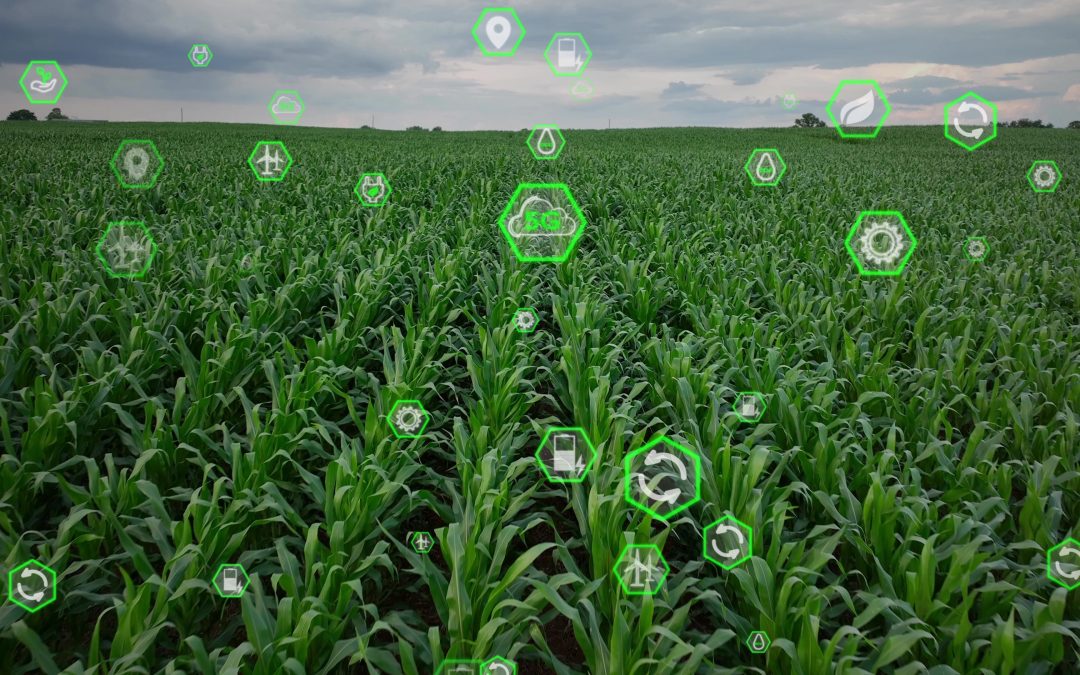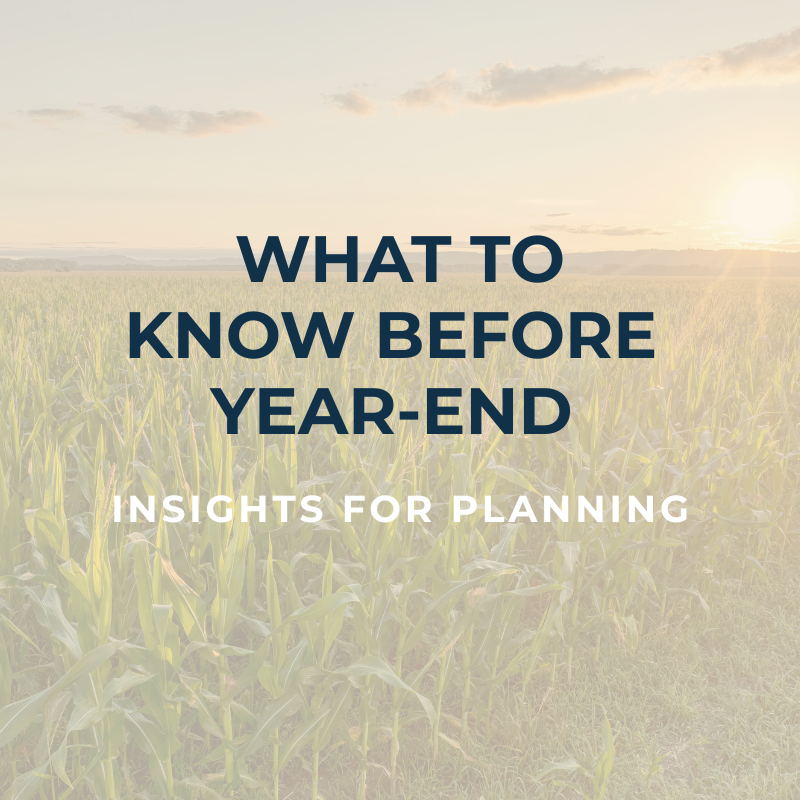As the end of the year quickly approaches, it is important for farmers to start thinking about year-end tax planning. There are many tax-saving aspects to consider that could help reduce tax liabilities for this year and future years. Farmers may have large deferrals of taxable income from the strong commodity markets from previous years and should consider planning that reduces these deferrals with the recent downturn in commodity prices. With farm profits expected to be lower in 2024, it may be beneficial for farmers to still show taxable income in the current year to make the best use of their lower income tax brackets and take advantage of current tax brackets scheduled to expire after 2025. Here are a few items that may apply to your farm operation and are worth considering during 2024 tax planning.
Deferred Payment Contracts
In normal circumstances, income is reported when cash from a sale is received. However, deferred payment contracts allow farmers to sell their grain in the current year with the option to defer receipt of payment to the next year. This gives farmers great flexibility when it comes to selling grain for the price they want and claiming the income in the year that is most beneficial tax-wise for them. Deferred contracts also have the flexibility to elect out of the deferral of income if it is better to have the income taxed in the current year instead of deferring it to the next year. Elections out of deferring income are made on a contract-by-contract basis, so it may be advantageous to have separate deferred contracts at smaller grain quantities to have the most flexibility.

Written by,
Erika B. Thies, CPA
Senior Accountant, HBE LLP
Bonus Depreciation and Section 179 on Fixed Assets
For fixed asset purchases, bonus depreciation allowed in the first year is reduced from 80% in 2023 to 60% in 2024 and to 40% in 2025. There are also certain limitations on the amount that can be deducted for vehicles. If income is expected to be high in the current year, bonus depreciation is still a good option to help reduce taxable income.
With decreasing bonus depreciation, certain eligible assets can still be fully deducted in the year they are placed in service under section 179. The maximum section 179 expense deduction is $1,220,000 for tax years beginning in 2024. The maximum deduction amount is limited when the cost of section 179 property placed in service during the year exceeds $3,050,000. Certain limitations for vehicles also apply.
Gifting of Grain to Children
Several tax benefits can result from gifting grain to a child. First, the income can be excluded from income while still being able to deduct the expenses incurred to produce the gifted grain. Second, if the child holds the grain for at least a year after harvest before selling, the gain will be subject to favorable long-term capital gain rates. Kiddie tax rules may still apply.
Gifting of Grain to Charity
Many farmers are not able to take advantage of itemized deductions. If a farmer typically takes the standard deduction, a tax benefit can be realized by donating grain to a charity in lieu of cash. The income can be excluded from income while still being able to deduct the expenses incurred to produce the gifted grain. For non-corporate farmers, this can result in the added benefit of reducing both income tax and self-employment tax.
Prepayment of Farm Expenses
If income is expected to be high in the current year, prepayment of farm expenses can help reduce taxable income. Please note, that only certain expenses qualify for prepayment. Please consult with your tax advisor on which expenses qualify. The following requirements must be met to qualify:
- Must be a prepaid farm supply expense such as feed, seed, fertilizer, and similar farm supplies.
- Should not exceed 50% of your total farm expenses for the year.
- The purchase should specify the price and quantity being purchased and cannot be just a “deposit”.
Paying Your Spouse and Children a Wage
If your spouse is involved in farm operations, you may want to consider paying them a wage. This would allow you to provide benefits to them such as medical insurance, medical reimbursements, and retirement. In addition, the wages paid and the cost of the benefits provided would be deductible against farm income.
You may also want to consider paying your children a wage for farm labor. You are allowed to deduct this amount from farm income as well. Assuming the child’s total income is below the 2024 standard deduction of $14,600, none of the wages paid to the child would be subject to income tax. This is an opportunity for a deduction for the farm but no income recognized to the child.
Additionally, wages paid to your child would be exempt from FICA taxes if they are under the age of 18 and are exempt from unemployment taxes if they are under the age of 21. You could also help your child get an early start on saving for retirement by contributing to a Roth IRA with these earnings.
Nebraska Tax-Specific Items
Pass-Through Entity Tax Election
Farm operations organized as a partnership or S-Corporation are eligible to elect to have the pass-through entity pay Nebraska income taxes on behalf of the owners. The taxes are then deducted from the pass-through entity’s federal income and reduce federal income taxes. Estimated Nebraska tax payments need to be made before the end of 2024 to enable those taxes to be deductible for 2024 federal income tax purposes.
Property Tax Credit
In the summer of 2024, legislation was passed to repeal the income tax credit property owners received on their income taxes for the portion of their property taxes allocable to schools. Instead, the State will now be providing these credits directly on the 2024 property tax statements. This means that farmers will receive their property tax credits upfront, but may need to adjust their 2024 estimated income tax payments to account for not getting the full amount of property tax credits on their Nebraska income taxes.
Farm Transition and Exiting Planning
Planning for transition or exit is crucial for farmers who are considering retiring or transferring farm assets and operations to the next generation. Strategies can be utilized to minimize deferred tax liabilities, optimize entity selection, and ensure the farm operation is set up for future success after transition. The best exit and transition plans take time to implement and it is never to early to begin discussing these topics with your advisor.
Estate Planning
The current estate exemption for tax year 2024 is $13.61 million. Therefore, estates valued at $13.61 million ($27.22 million for married taxpayers) or less are not subject to estate taxes. The estate tax rules and regulations for future years will depend on which administration is elected in November and subsequent changes in laws. Reviewing estate planning and total estate value now is crucial to get ahead of these potential changes.
Estimated Tax Payments
Farmers have two options for tax filing and payment deadlines. In the past, some farmers filed and paid their taxes by March 1st. However, with changing tax laws, delays in receiving tax forms, and increasing complexity in tax preparation, many times it is difficult to file accurately prepared tax returns by March 1st.
To avoid needing to file tax returns by March 1st, a 4th quarter estimated tax payment can be made by January 15th. This allows the tax deadline to be the normal date of April 15th (October 15th if the return is extended). HBE highly recommends making a 4th quarter estimate to avoid penalties and interest and provide more time to prepare and file an accurate tax return. This should be a part of annual tax planning.
HBE is Here to Help
Political uncertainty and decreasing farm commodity prices have made for a challenging 2024, making tax and estate planning crucial to the ongoing success of farm operations. Please reach out to your HBE advisor with any questions to begin the 2024 year-end planning process.




